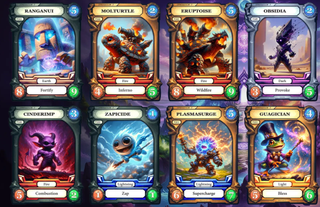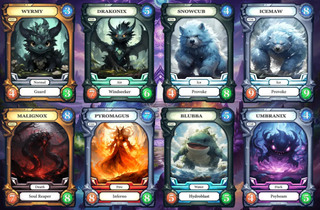Card game developer says it paid an 'AI artist' $90,000 to generate card art because 'no one comes close to the quality he delivers'
"For us to get this with a team of traditional artists it would cost us a lot more money, and time," the developer told us.

The maker of digital trading card game Champions of Otherworldly Magic says it has spent $90,000 on card art, the entirety of which has been paid to a single "AI artist" who receives $15,000 per month despite dedicating less than two full work days to the project each month.
"We pay our AI artist 15,000 USD per month for exactly 10 hours of work," reads an X post from the official Champions TCG account. "Why? In that time, he still makes HUNDREDS of AMAZING bits of artwork—ASTRONOMICALLY FASTER than ANY team of traditional artists.
"His art is 100% AI generated, yet it has no extra fingers, no generic designs, no mistakes... It has consistent evolutions, skins, alt art styles—literally no one is on his level. We don't care how he makes it, we only care that the end user enjoys our game."
According to Champions TCG co-founder and CEO Miles Malec, who spoke to PC Gamer over DM, the artist has made over 1,000 images with generative AI over the course of six months, and was paid $15K each month. The anonymous artist "has 15 years of digital art experience" and doesn't use social media, he says.
"For us to get this with a team of traditional artists it would cost us a lot more money, and time," said Malec. "The guy's a pro and he charges what he's worth. We are well connected in the space and no one comes close to the quality he delivers."
According to Malec, Champions has made "about $500K" in card sales so far. Its raison d'etre is that its cards are NFTs which can be traded or purchased with cryptocurrency, but the developer also sells "gems"—which can be traded in for card packs—in exchange for regular US dollars, and those credit card transactions are where most of the revenue has come from so far.
The card images aren't quite "100%" AI generated, as the X post says. Malec says they're also touched up by hand: "AI can do bulk of the work/initial generating but to make sure no errors, extra fingers, etc everything needs to be edited and filtered."
The biggest gaming news, reviews and hardware deals
Keep up to date with the most important stories and the best deals, as picked by the PC Gamer team.

The full collection of Champions cards can be viewed on its website. The illustrations run into occasional trouble with claws and paws, and each looks more or less like something you've seen before—some uncannily so—but they're passable. Someone who didn't know they were AI generated might think they were just generic Blizzard or Riot-inspired cards.
The game's official X account has been defending the card images today. Responding to a user who said that a kindergartener could do what their AI prompt guy does, the Champions account said that "ignoring the skill and talent it takes is insane."
I'm personally struggling to believe that anyone would pay $1,500 an hour for this work, whether or not it requires skill and talent, but that aside, I think the big picture is that we've rapidly passed the theoretical phase of generative AI's effect on games into the 'it's happening now' phase. AI generated images have also appeared in marketing material from major game publishers, including Magic: The Gathering maker Wizards of the Coast, but unlike some of those companies, the Champions developer is anything but apologetic about its use of a tool that many consider unethical.
Instead, the company challenged artists to complete a series of "art tests" in 48 hours, claiming that anyone who can match the quality of its AI prompt writer will be considered for a job as their assistant.
We pay our AI artist 15,000 USD per month for exactly 10 hours of work.Why? In that time, he still makes HUNDREDS of AMAZING bits of artwork - ASTRONOMICALLY FASTER than ANY team of traditional artists.His art is 100% AI generated, yet it has no extra fingers, no generic… https://t.co/IlAhJ2pdnp pic.twitter.com/a2TJcLLhsPApril 8, 2024

Tyler grew up in Silicon Valley during the '80s and '90s, playing games like Zork and Arkanoid on early PCs. He was later captivated by Myst, SimCity, Civilization, Command & Conquer, all the shooters they call "boomer shooters" now, and PS1 classic Bushido Blade (that's right: he had Bleem!). Tyler joined PC Gamer in 2011, and today he's focused on the site's news coverage. His hobbies include amateur boxing and adding to his 1,200-plus hours in Rocket League.
Most Popular




